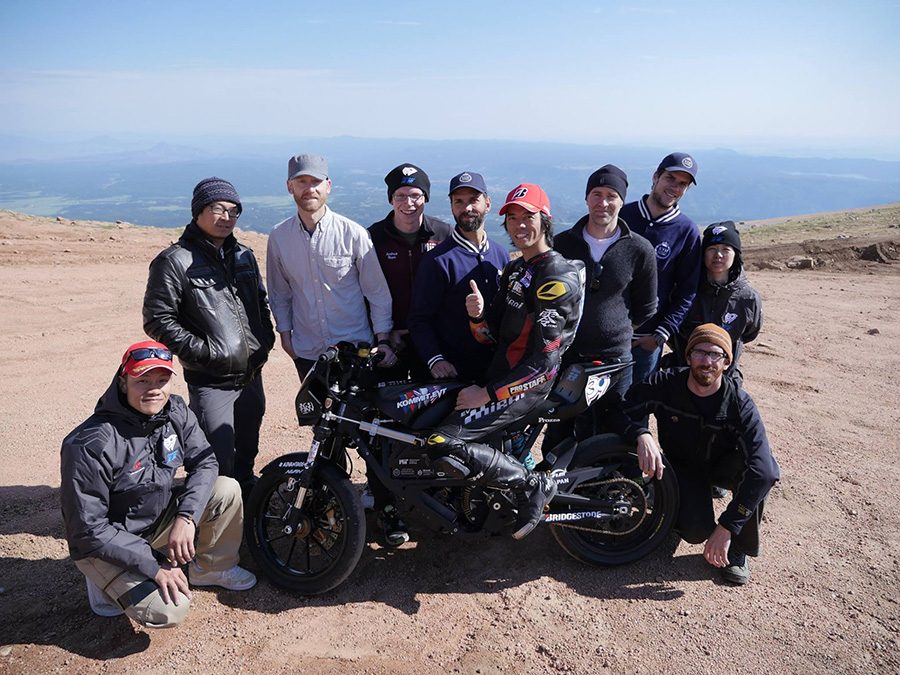Kento Masuyama
From Starr’s Mill to the stars
Panther grad Kento Masuyama (lower left) poses with his electric motorcycle racing team at Pikes Peak, Colorado. Masuyama now lives in Tokyo where he works as a satellite systems and propulsion engineer.
Panther alumnus Kento Masuyama graduated from the Mill in 2006 and has since pursued his dreams of studying space engineering.
During his time at the Mill, Masuyama was involved in a wide range of extra-curricular activities including competing on the cross country, track and field, math, academic, and Science Olympiad teams, participating in Spanish competitions, volunteering for both Beta Club and National Honor Society, and playing in the school orchestra.
“Of those, I was most invested in cross country and orchestra. I managed to make it onto the varsity roster for my senior year and run at state,” Masuyama said. “I also remember playing in the pit orchestra with Chanticleer for premiering James Mulholland’s ‘Missa Romantica’.”
Masuyama’s career interests differed far from his musical and athletic passions though. As shown by his involvement in scientific and mathematical teams, Masuyama also displayed an interest in engineering, one he hoped to pursue after high school.
“I had a rough idea that I would go into engineering, most likely something related to space exploration,” Masuyama said. “I didn’t have a firm roadmap or anything, but considering the educational requirements for engineering meant I’d be in school for at least another six years or so, I wasn’t in a particular rush.”
After graduating from Starr’s Mill in 2006, Masuyama attended Georgia Tech and majored in aerospace engineering. There, Masuyama did two years of undergraduate research in the Space Systems Design Lab.
“I was always good at math and physics, but I wanted to be involved in practical projects with physical things and not abstract theoretical concepts,” Masuyama said. “Also, I was a big ‘Star Wars’ fan and watched the movies enough to realize that the space battles didn’t follow rules of physics. I wanted to know how far from reality those movies were, and how actual spacecraft behaved.”
Following his career at Tech, Masuyama attended graduate school at MIT where he earned his Master’s and Ph.D. in Aeronautics and Astronautics.
“After grad school, I wanted to know what it was like to live in Japan as an adult,” Masuyama said. “Also, I had enough experience in the U.S .aerospace industry to know it can be isolated from foreign space activities. I wanted to get outside of that to get a wider view on the whole industry.”
Currently, Masuyama lives in Tokyo where he is employed as a satellite systems and propulsion engineer. He has been working there since completing graduate school in 2016.
“I design, build, and operate satellite,” Masuyama said. “Most days, it’s making sure the correct information gets routed to the correct people so that the entire team can move in the right direction. On a fun day, I might implement new control algorithms in our high fidelity simulator or perhaps test a component for the next satellite.”
As Masuyama’s high school self-predicted, he ended up pursuing his interest in space engineering. To current students at the Mill, Masuyama advises enhancing interpersonal skills just as much as hard skills as communication is key in any career field.
“Engineering is a lot of teamwork. I knew that as a concept, I think, but in practice that involves a lot more soft skills than I expected,” Masuyama said. “Being able to crunch numbers and conduct complex analyses is great, but it’s only useful if you can communicate the results and convince people including those who don’t speak technical jargon. Learn to explain complex things in non-complex ways, and that will get you far.”
Looking forward, Masuyama hopes to continue to advance himself career-wise and immerse himself in the field of space engineering.


